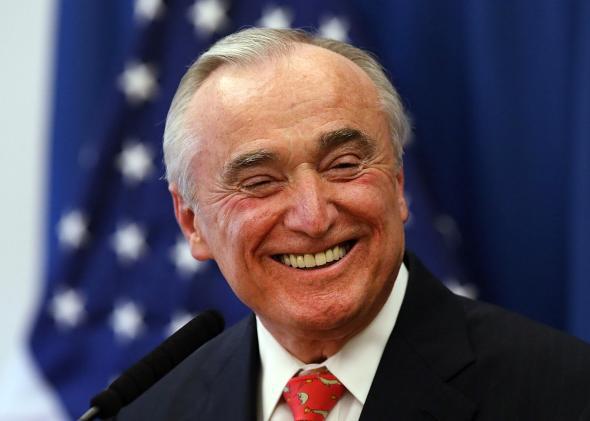The New York Times is reporting that New York City Mayor-elect Bill de Blasio has chosen William Bratton to succeed Ray Kelly as commissioner of the New York Police Department. This will be Bratton’s second stint in charge of the NYPD; he also ran the department during the Giuliani administration, and received much credit for the substantial drop in the city’s crime rate during his tenure. Since then, Bratton has gone on to command the Los Angeles Police Department, work in private industry, serve as a criminal justice commentator on NBC, and, weirdly, be named a Commander of the Most Excellent Order of the British Empire. (Bratton narrowly beat out de Blasio’s second choice for the job: Sir Archibald Whitworth of Sussex.)
Bratton will be expected to keep the city safe while simultaneously renewing New Yorkers’ confidence in a police department that has been sharply criticized in recent years, most often for its divisive stop-and-frisk policy. (De Blasio has promised to reform stop-and-frisk, and this will be one of Bratton’s most important jobs.) There are plenty of reasons to think that Bratton’s up to the task. He has a reputation as a brilliant tactician and a lifelong innovator, a leader who’s good with organizational management and unafraid to delegate authority. He’s also an ambitious self-promoter who thinks very well of himself. That doesn’t really bother me: If hustlers and narcissists were disqualified from holding public office, then every city hall in America would be empty. But there are a couple of other, more substantial reasons why I think it’s valid to question whether Bratton is really the best man for the job.
For one thing, Bratton is a hard-core technocrat—in recent years, he co-founded a company called Bratton Technologies that, as far as I can tell, built some sort of social network for law enforcement officers. More significantly, in the 1990s Bratton developed and deployed CompStat, the crime statistics program that, by tracking arrest, summons, and complaint data citywide, was supposed to help the NYPD recognize patterns, evaluate its tactics, and better allocate its resources. Since then, many other police departments have adopted similar programs.
There’s nothing wrong with compiling good data on crime, and in acting on that data. But CompStat meetings too often become poisonous affairs where commanders are berated and embarrassed in front of their peers if they fail to show sustained statistical improvement in their precincts. If all that matters are the numbers, then managers will do whatever it takes to make those numbers look good, regardless of whether the tactics they use to do so are actually good for the community. This is the sort of mentality that leads police departments to impose arrest and summons quotas and artificially downgrade crime reports. This is exactly the mentality that leads to stop-and-frisk excess. We can expect Bratton to tout the uses of programs like CompStat. It remains to be seen whether he’ll want to curb the abuses, or whether he’ll be able to even if he wants to curb them.
Bratton also loves the “broken windows” theory of policing. Loves it, regularly defends it, would probably marry it if our laws allowed him to do so. And that might be a problem. As I’ve written before, adherents of the “broken windows” theory believe that a disorderly city is a dangerous city, and that taking a hard line on quality-of-life violations can help prevent more serious crimes. Under Rudy Giuliani’s direction, Bratton implemented broken-windows strategies in New York in the 1990s, and, lo and behold, the crime rate dropped. Bratton and Giuliani naturally saw this as a validation of these broken-windows tactics, but there’s plenty of reason to believe that other factors—like the end of the 1980s crack cocaine epidemic, for one thing—played a far greater role in dropping the city’s crime rate.
One of the main problems with broken windows is that it gives bad cops an excuse to harass poor minorities who have the misfortune to live in relatively dangerous neighborhoods. Most people who live in dangerous neighborhoods aren’t criminals; they’re regular, honest people who can’t afford to move elsewhere. But by confusing urban decay for moral decay, broken windows encourages cops to treat all poor people as guilty parties. A close cousin to broken-windows policing is “zero tolerance policing,” in which cops actively arrest people for small infractions in hopes that this will then lead to bigger things. The city becomes safer by getting potential felons off the street, someone arrested for drug possession rats out his dealer—those sorts of things. Broken-windows strategies and zero-tolerance policing strategies go hand in hand. But, as I wrote last month in an article about an out-of-control zero-tolerance program in Miami Gardens, Fla., zero tolerance can also lead to serious civil rights abuses when overzealous beat cops disregard or misunderstand what the program was meant to accomplish.
Since leaving the NYPD in 1996, Bratton has continued to defend broken windows, which strikes me as a serious handicap for a man who will be expected to engender good will in New York’s minority neighborhoods. And it makes him a very weird choice as the man expected to lead the department out of the civil-rights-violating stop-and-frisk era.
